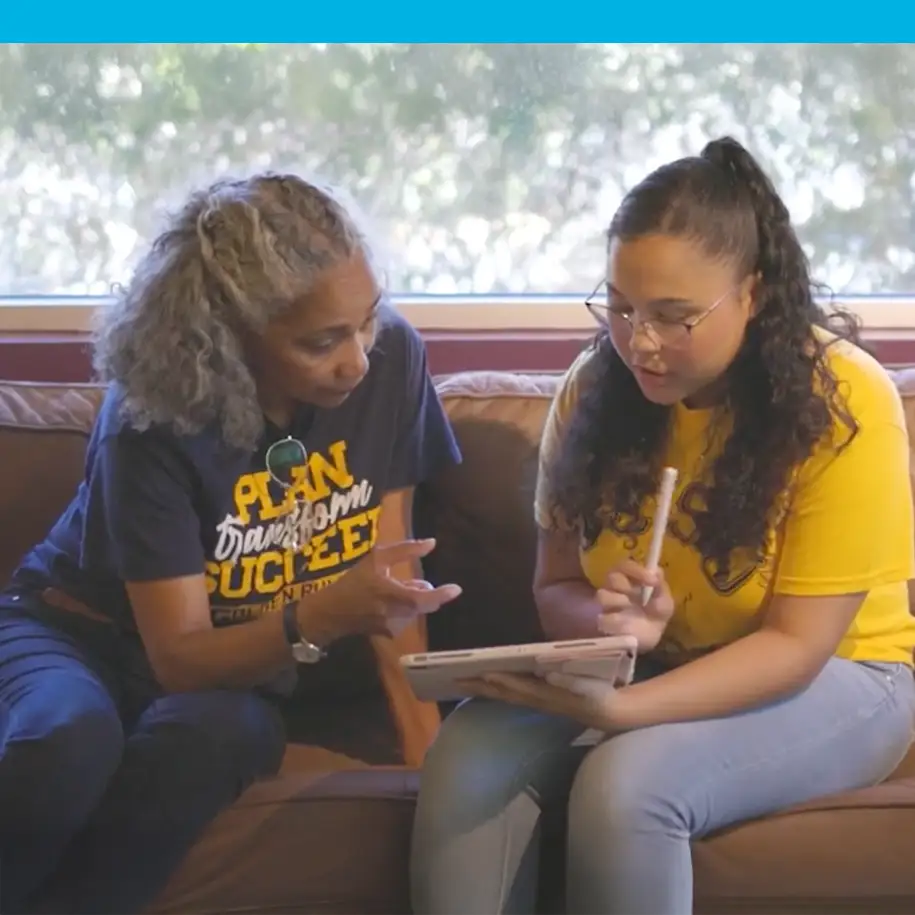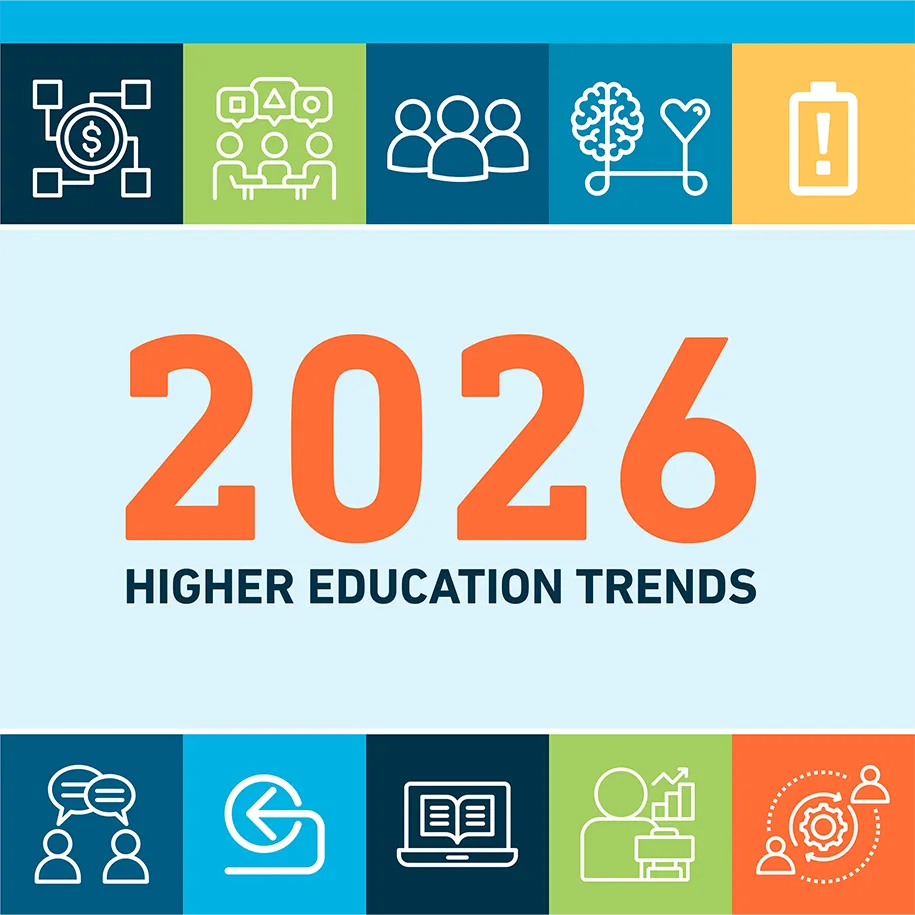
Focus on career readiness to help enroll and retain students
Making career readiness an integral part of the education journey
Given the higher-than-ever cost of colleges and universities, return on investment is a crucial consideration for the vast majority of students entering school. Learners want to make sure, even before they enroll, that the education pathway they choose will pay off at the end of their degree or certification program. This is true for both traditional and adult learners – and most especially for learners who are in education programs to directly impact their jobs.
The value of career readiness for traditional students
Career readiness broadly prepares students for success in the workplace by providing a foundation of the essential skills for and information about working in their chosen field. However, as traditional education has evolved through the years, its focus has shifted from skill development toward a more theoretical curriculum.
This means that while every college student should be receiving an education that includes teaching them the skills needed for real-world employment, not all colleges or universities offer this kind of career preparation. This is not only a loss for the students but a lost opportunity for the institutions that educate them. In a climate where the value of a degree is a hot topic of debate, institutions that do focus on career readiness would be wise to highlight it — and use it as a powerful way to attract value-minded students.
The value of career readiness for non-traditional students
Non-traditional students — students who have not taken a direct pathway from high school to college — tend to enroll in postsecondary programs with a specific job outcome in mind. Looking to update their current skills, gain new ones, or switch careers, they need to earn the credentials necessary for success and advancement in the workplace. This on-going demand for reskilling and upskilling presents an ideal opportunity for colleges and universities to drive enrollment. These institutions should be focusing on their continuing, professional, and workforce education program offerings as a way to attract and retain these career-focused, non-traditional learners.
Career and Technical Education (CTE) pathways, which offer another important avenue to career readiness, provide millions of non-traditional learners of all ages and backgrounds the skills and knowledge they need to obtain and succeed in a quality job. Though CTE student populations are high, CTE students are too often deprioritized against credit programs and overlooked in discussions about guided pathways. This is an area ripe for change.
Integrating CTE programs with degree pathways would improve the student experience while boosting enrollment at these schools. Not only do CTE programs bring in a great deal of funding, but they have also been delivering impressive student outcomes — a win for the community, the workforce and the community colleges themselves.
Using career readiness to boost enrollment and retention
Explicitly bridging the gap between education and career is a way to help students of all ages and at all types of institutions find true value in their education while also providing them a more clear pathway to their career.
PCC used a local career fair to reconnect with former students
For stopped-out learners, seeing and understanding the connection between career education and career advancement can be the exact motivation they need to return to the classroom. Knowing that only a compelling reason would inspire re-enrollment, Dr. Lawrence Rouse, president of Pitt Community College (PCC) and Dr. Johnny Smith, PCC’s former vice president of strategic initiatives and community engagement, created a local job fair as a way to attract and connect with adult learners in the area.
Done in partnership with local economic development agencies and employers, the “Better Skills, Better Jobs” fair was the perfect way to underscore the connection between education and skill-based work. And it was a huge success, drawing over 400 adult learners — potential prospective students who are looking to link their degree, credential or CTE programs to better employment opportunities. Learn more about PCC’s re-enrollment strategies in our guide: Reconnect, Re-enroll & Rise.
NCTC starts students on their career path — while they’re in high school
North Central Texas College (NCTC) began their work on connecting education and career even before students stepped foot on campus. Texas students have to choose a pathway – between STEM, business and industry, public services, arts and humanities or multidisciplinary studies – in the 8th grade. By high school, they’re moving along that pathway. NCTC’s “Rural Promise in a Box” program was designed to promote college attendance in 14 rural area high schools. Noticing how many students changed their majors after their first semester, NCTC coaches switched it up and began career-coaching students before they declared a major. They had students look into the specifics of their intended path, research a day in the life of someone in the occupation they were pursuing, and review current job postings to see education and experience requirements. This early work was highly beneficial for these students in helping to prepare for choosing the right schools and career pathways — ultimately making sure students enrolled in a program that felt connected to their career goals.
Idaho PTECH leverages proactive coaching to make rural high school students job ready
Statistically, roughly one-fifth of all public school students attend school in rural areas with fewer than 2,500 residents. Providing job opportunities after high school graduation is a challenge, causing most graduates to leave the area to pursue their career. To help turn the tide, the Idaho Pathways to Early Career High School (PTECH) program focused on helping rural high schoolers continue their education after graduation with an associate’s degree in information technology, medical assisting or airplane maintenance and composites — each local industries in need of highly skilled workers.
Using grant funds, PTECH connected self-selected rural high school students with InsideTrack coaches to help them throughout their educational journey. Holistic coaching helped students balance school with work and other commitments, as well as developing and honing career-ready skills such as communication, teamwork, problem solving and critical thinking. More than 800 students participated during a four-year span — with 68.7% of them indicating they had gone on to postsecondary training, well over the state’s go-on rate of 45%.
Improve career readiness through coaching
All students — traditional and non-traditional, true freshmen and adult learners — would benefit from individualized guidance that connects the classroom to on-the-job scenarios. InsideTrack is uniquely qualified to help colleges, universities and organizations equip their learners with the career readiness skills they need.
Designed to get learners ready for today’s workplaces, our career coaching supports career discovery, helping participants maximize educational offerings to get a job, internship or apprenticeship in their chosen field, with the ultimate goal of promoting long-term career success. Career-ready students can more easily and successfully move into their chosen job once they complete their degree, certification or training.
While this gives these students a competitive edge in any employment landscape, providing career readiness and coaching offers an equally important benefit for institutions by helping them retain these students and support them to completion. The positive impact extends even further than that. Equipping individuals to enter their careers with essential employability skills and as productive members of the workforce provides a real benefit to employers — and for society as a whole.
More than ever, the key is to make career readiness part of prospective student engagement right from the start. Not only does this give students a better sense of the connection between their studies in school and the career goal at the end of their journey, it also gives them a clearer vision on the path they need to take in order to achieve their goals and begin their career.
Ready to make career readiness a priority? Learn how adding coaching to your student support program can bolster the connection between school and career.
Coaching solutions proven to advance all learners
Whether you’re looking to help students persist through completion or to improve career outcomes for job seekers and employees, our holistic coaching solutions can help you achieve meaningful outcomes.



